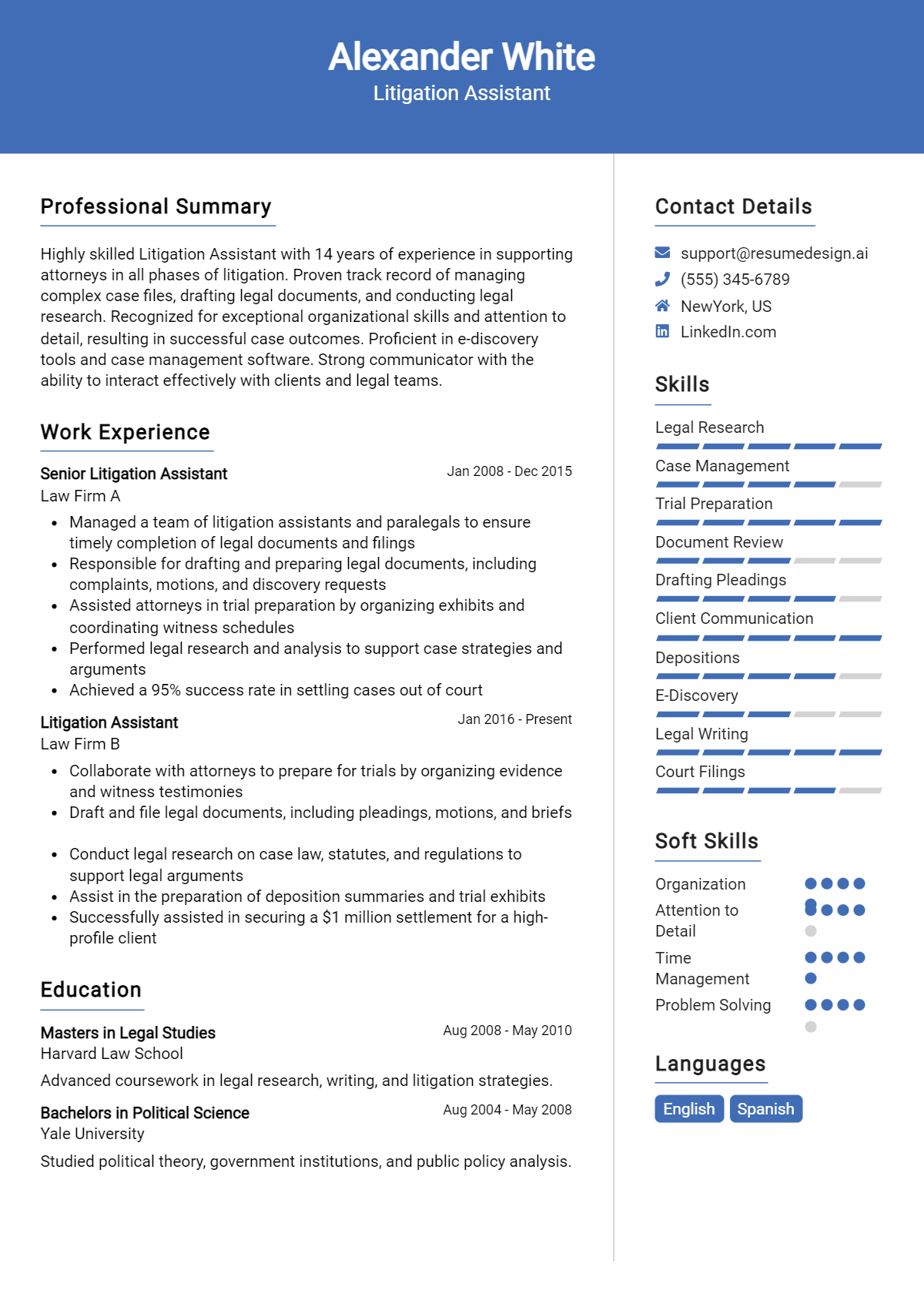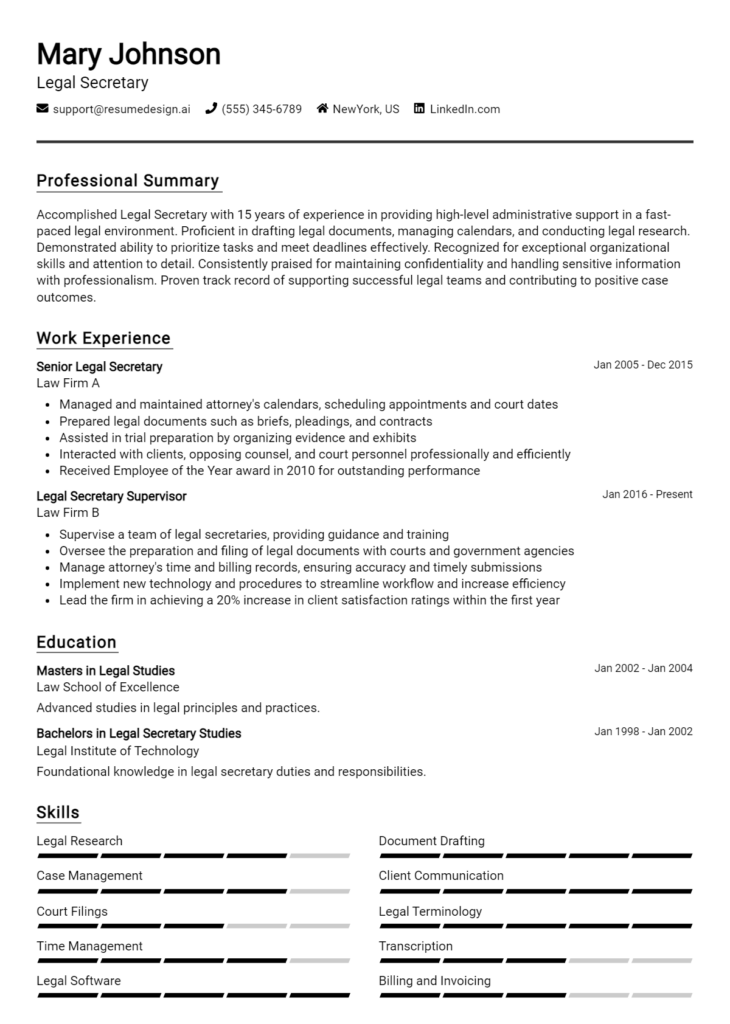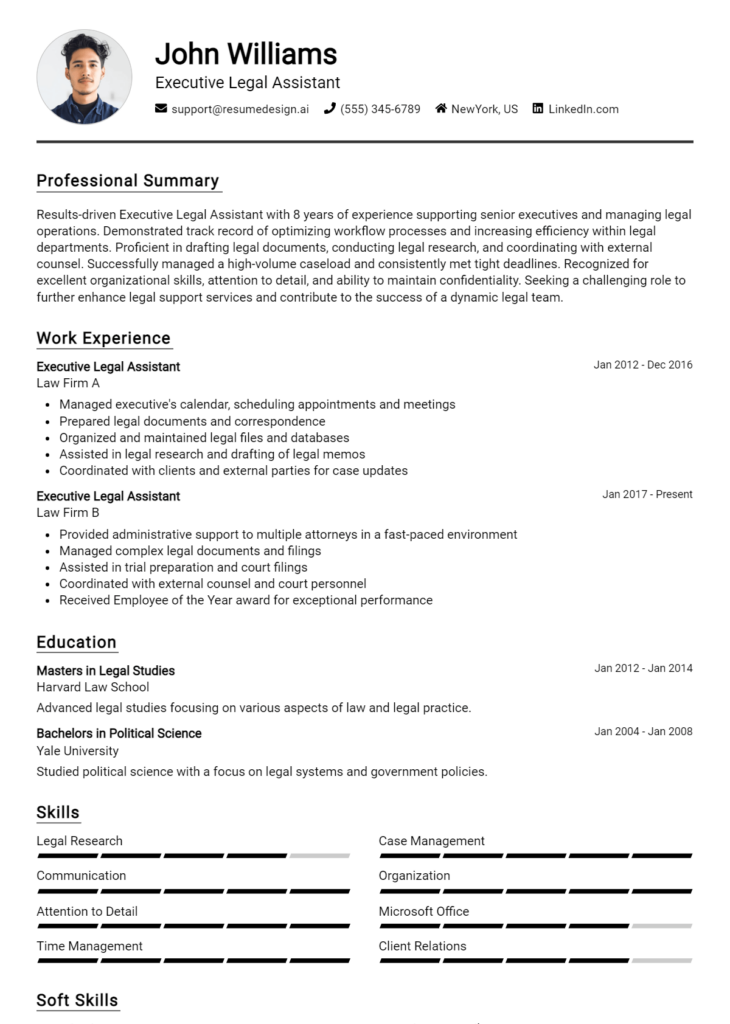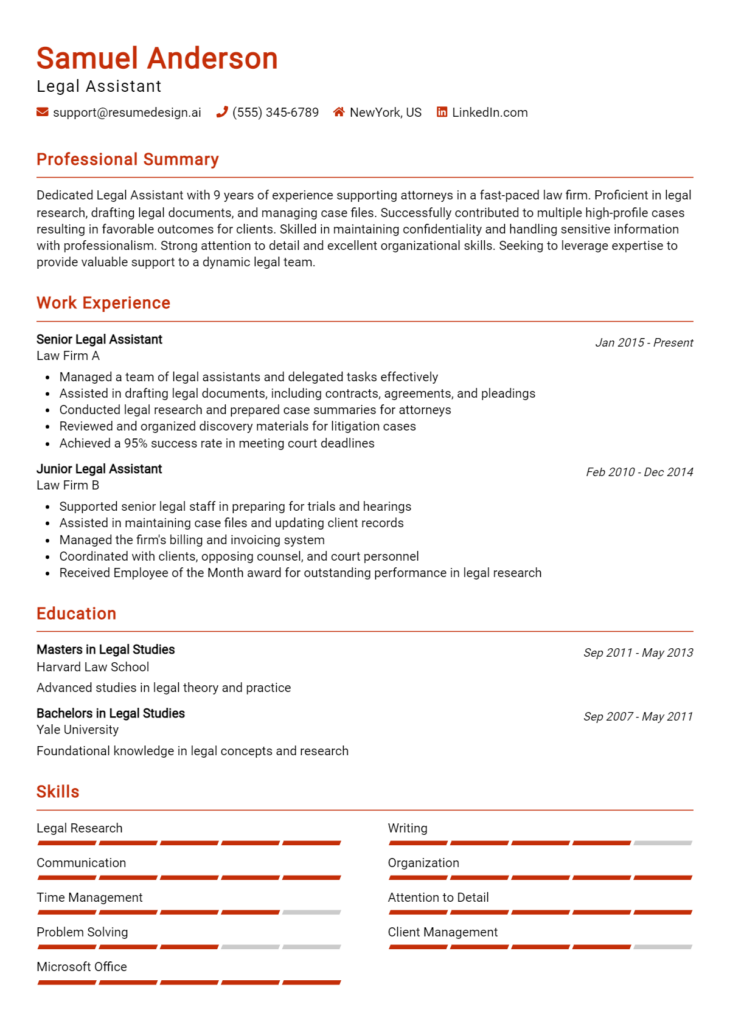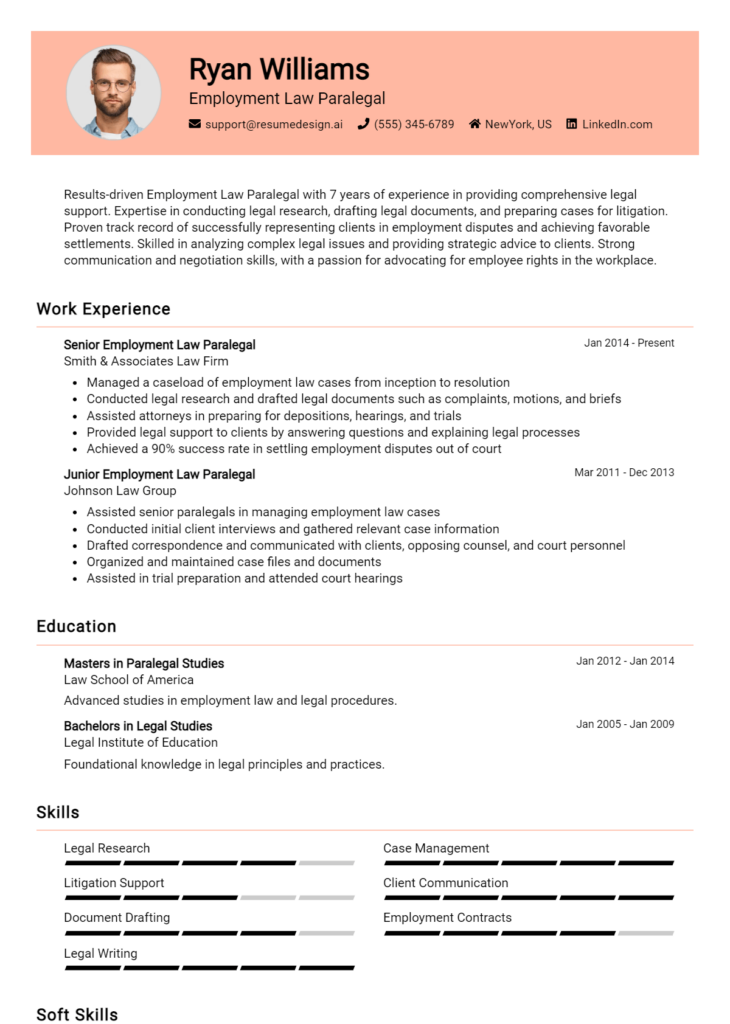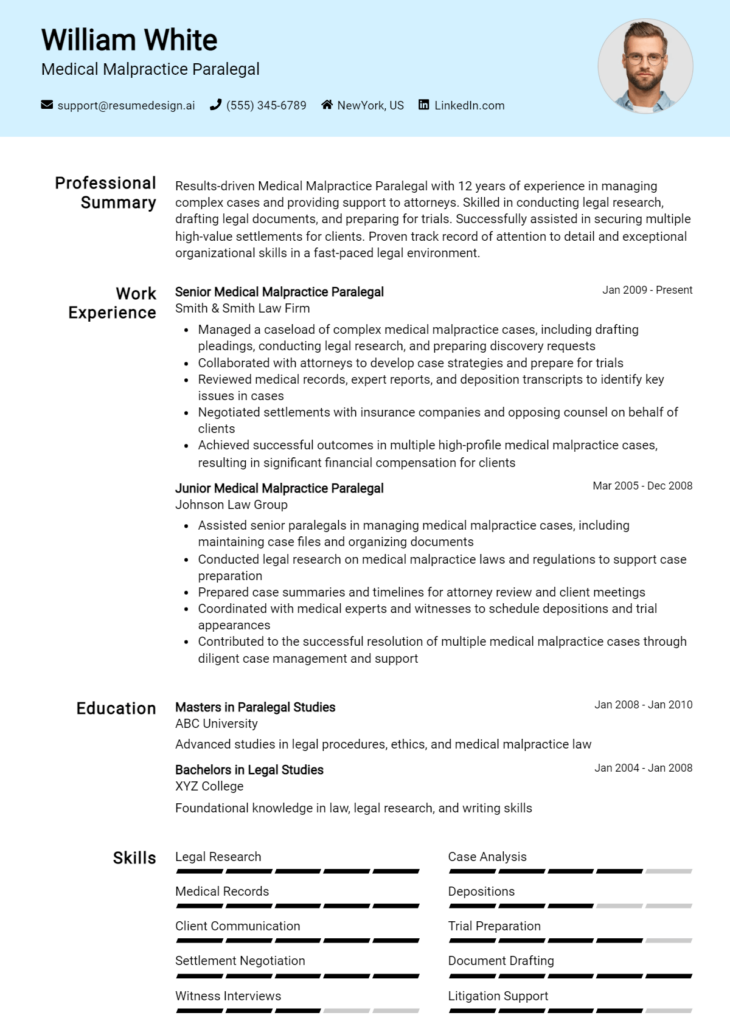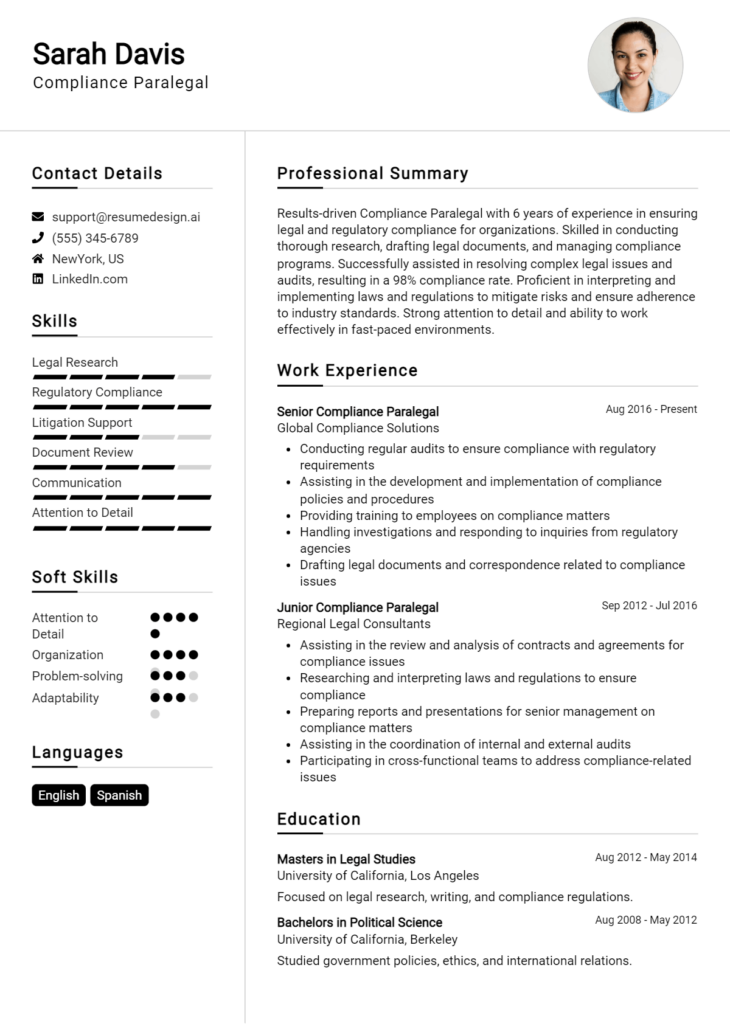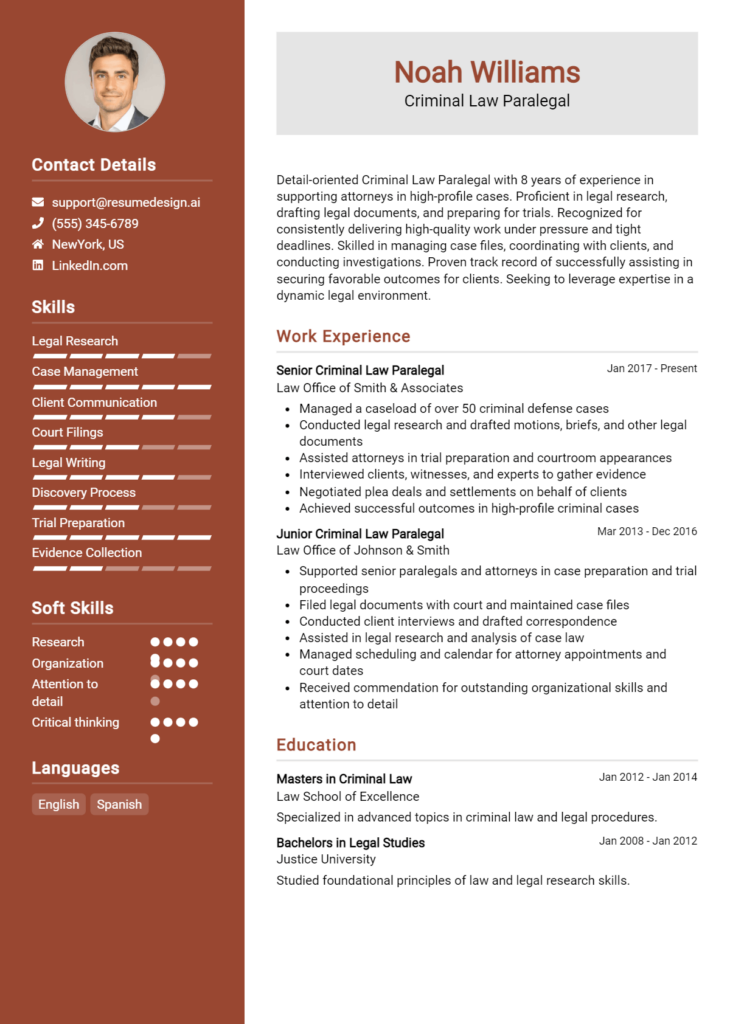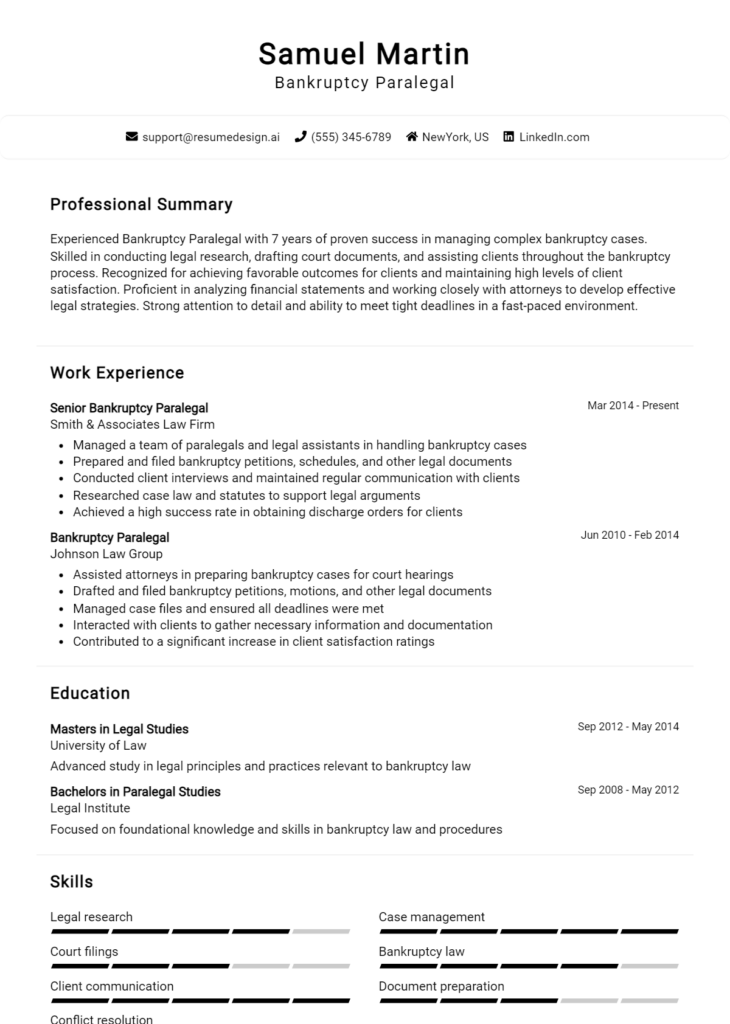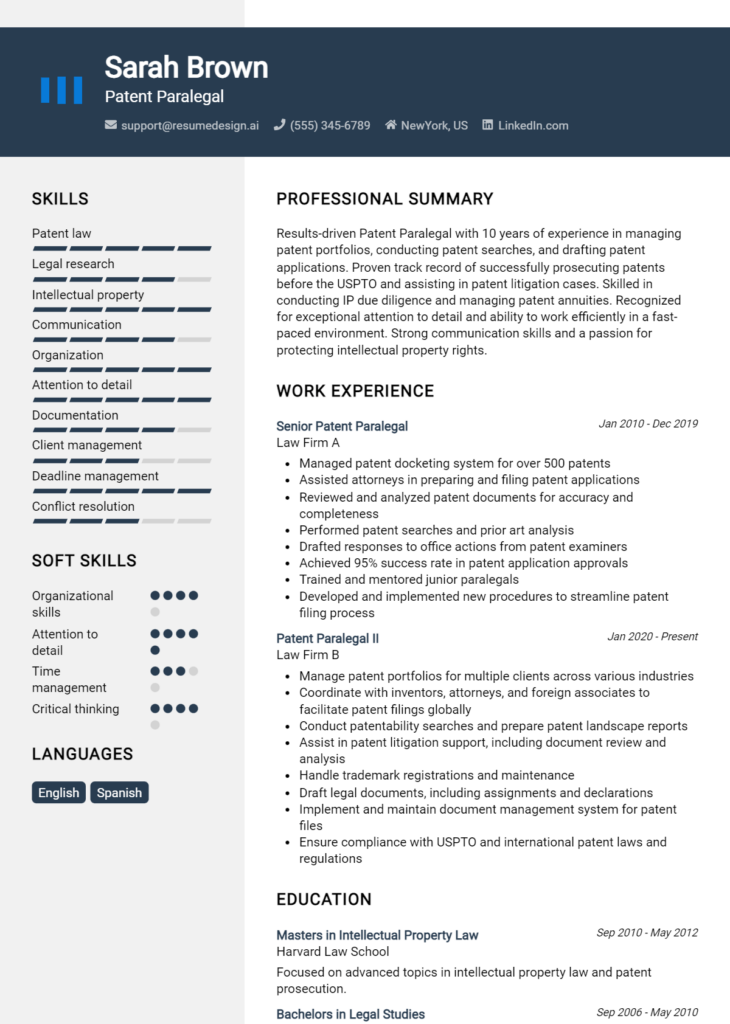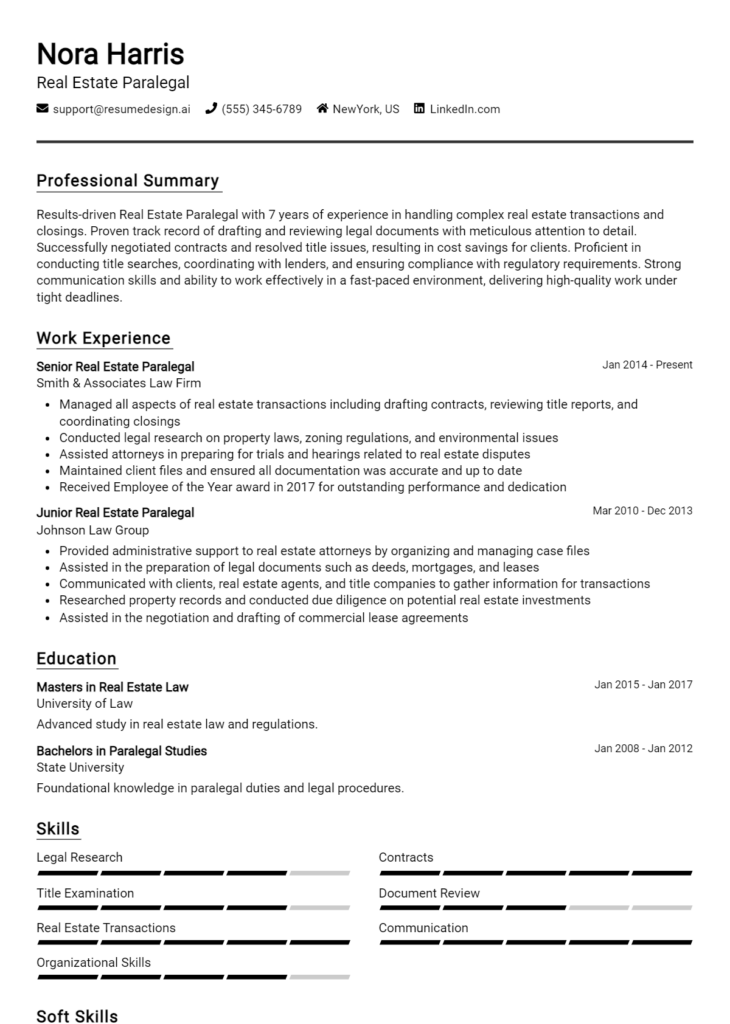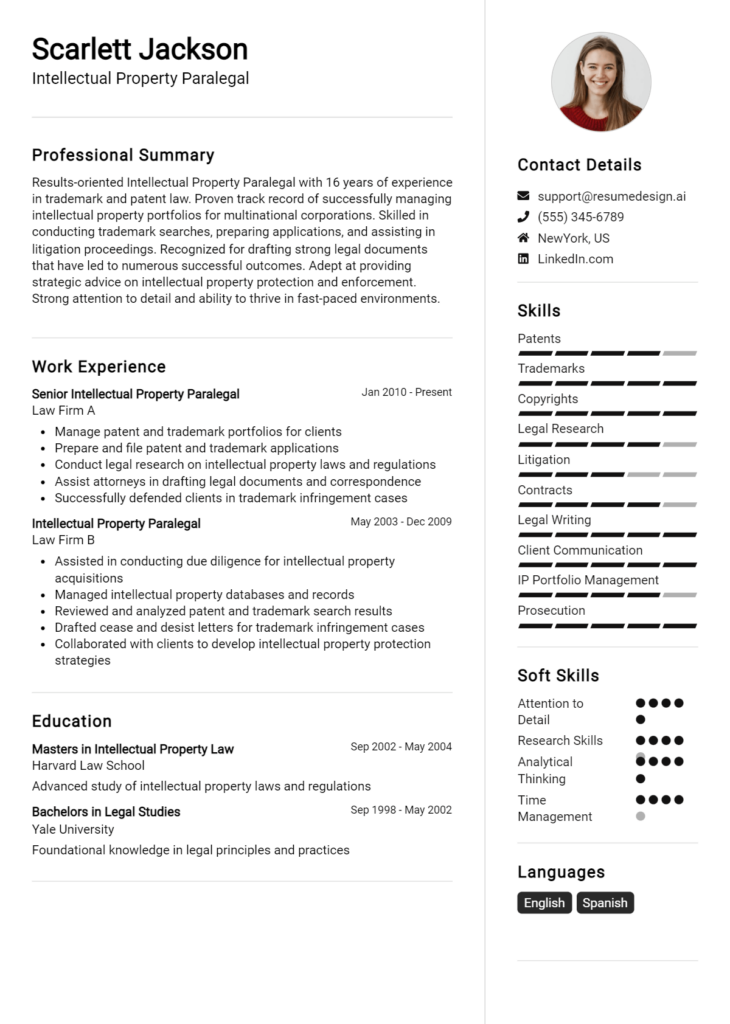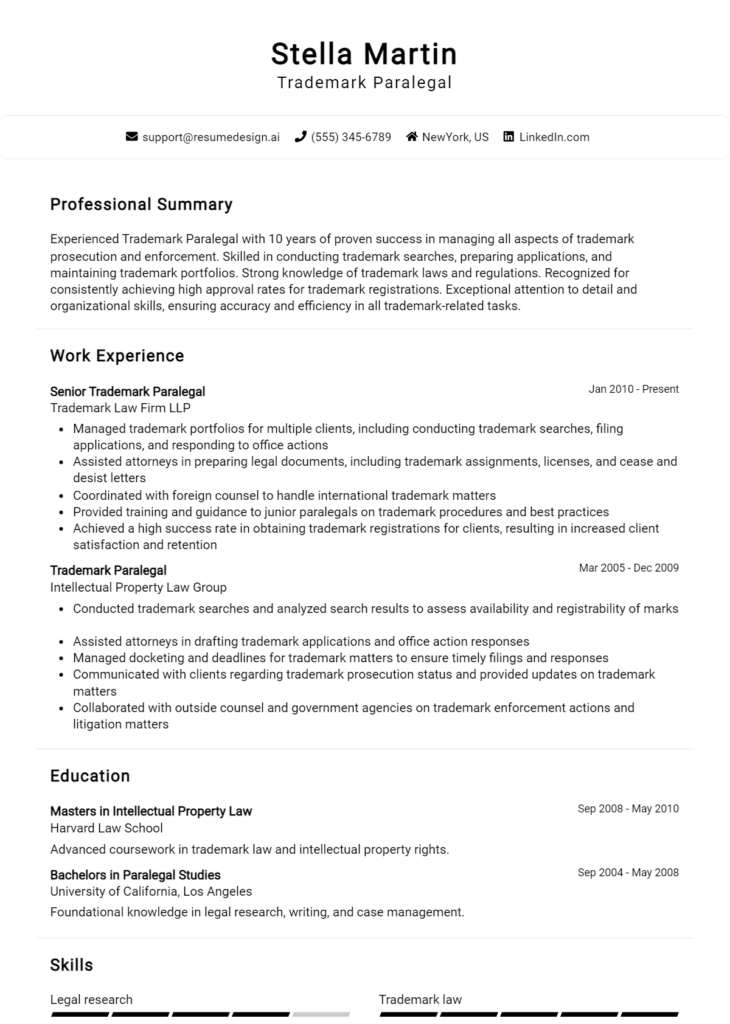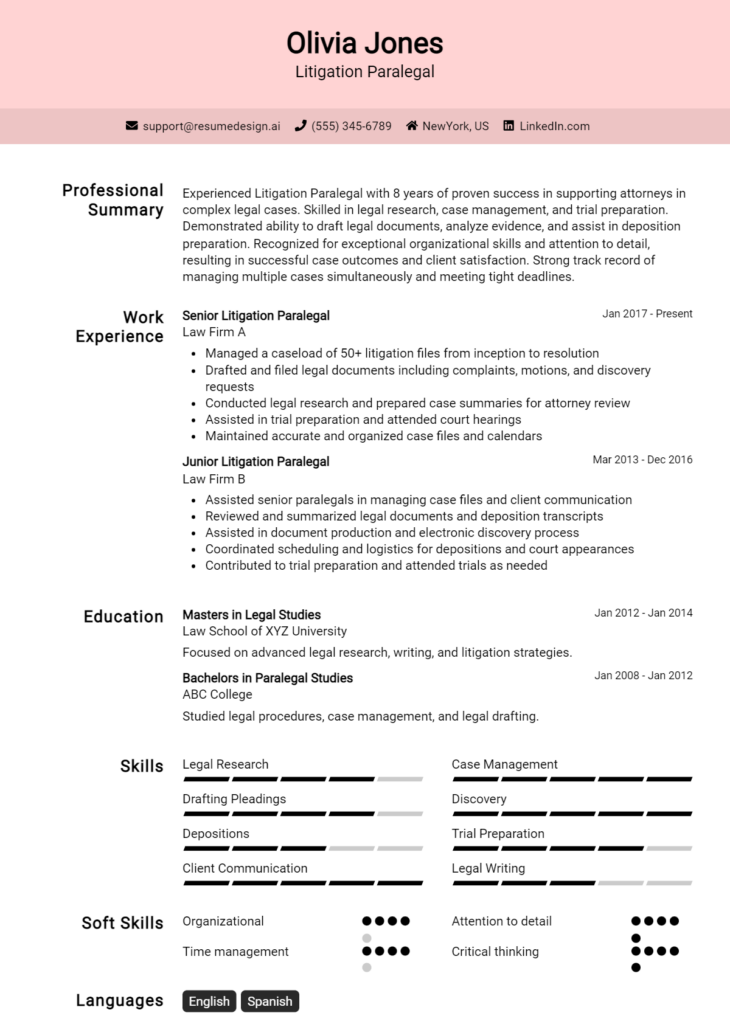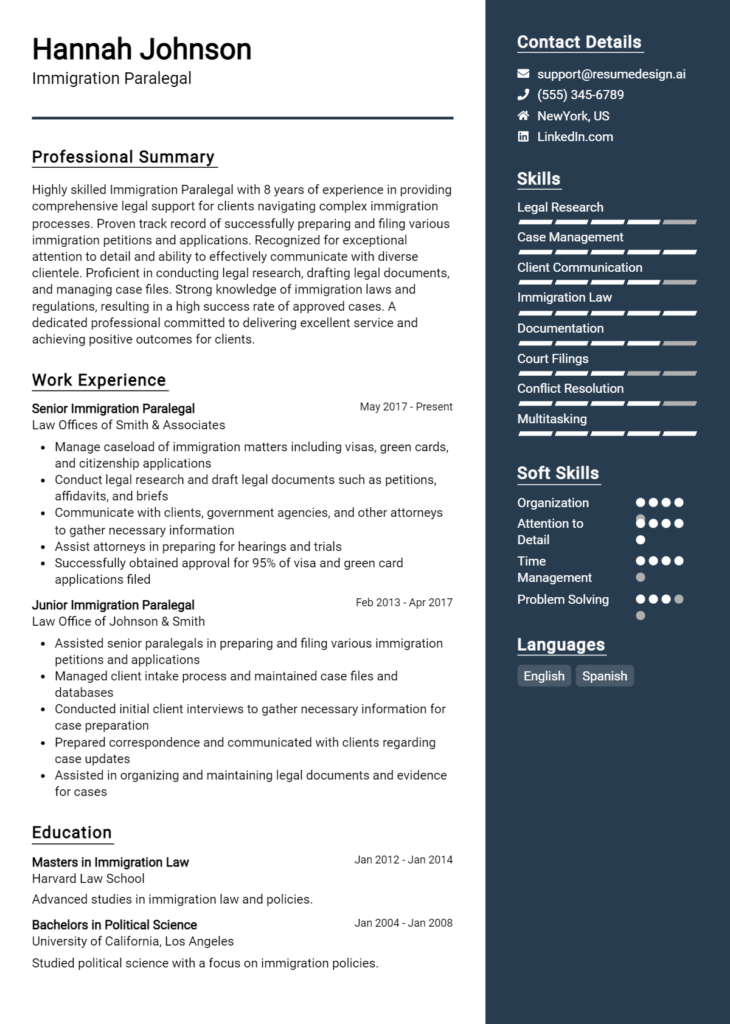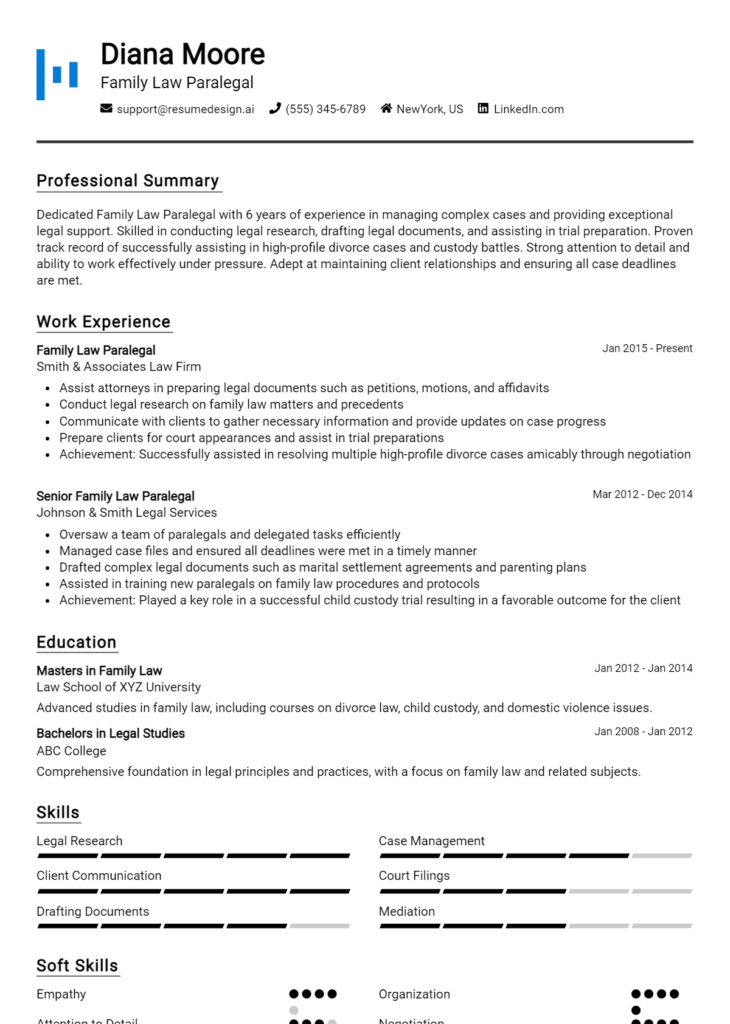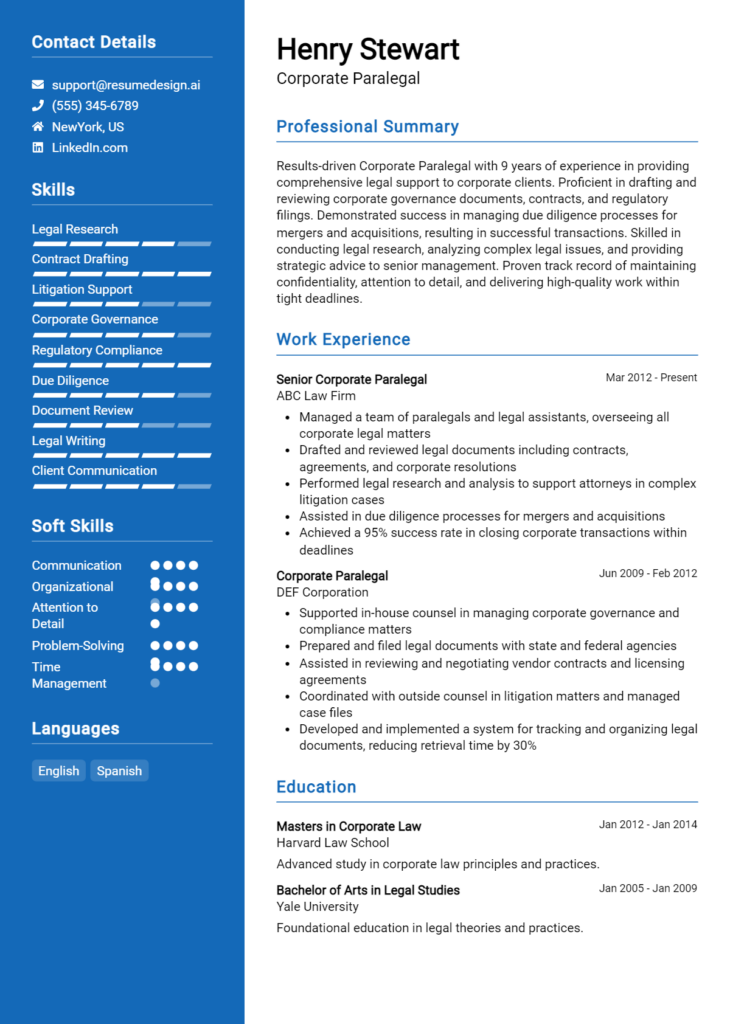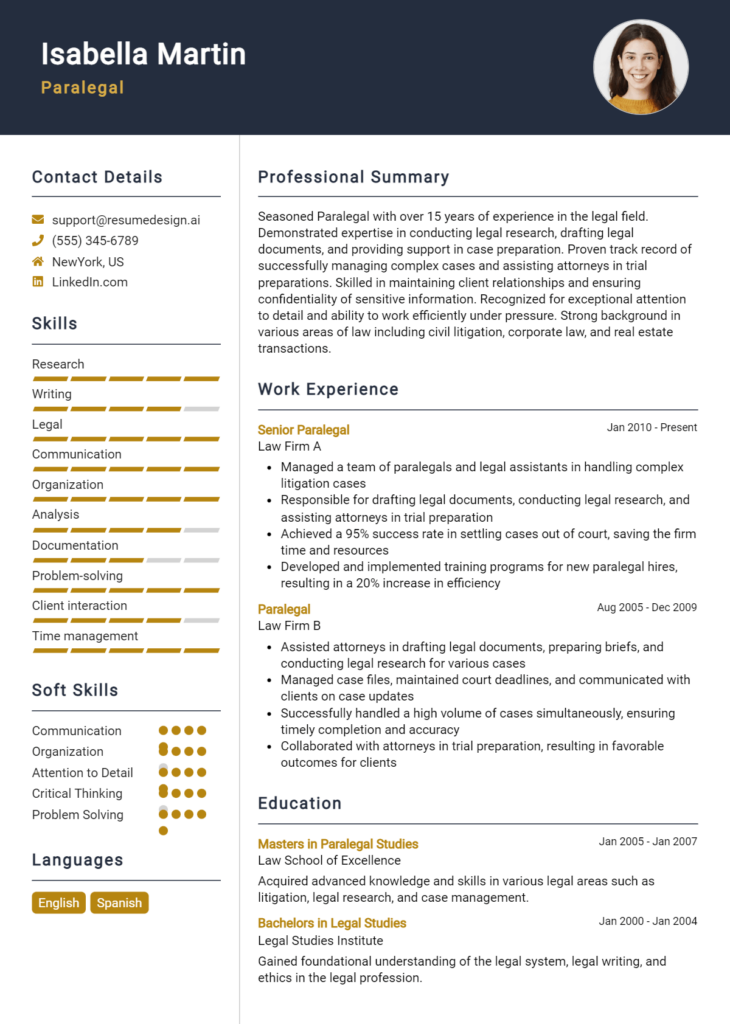Litigation Assistant Core Responsibilities
A Litigation Assistant plays a crucial role in ensuring the smooth operation of legal proceedings by supporting attorneys with various tasks. Key responsibilities include managing case files, conducting legal research, drafting documents, and coordinating communication between departments. Essential skills encompass technical proficiency in legal software, operational efficiency, and strong problem-solving abilities, all of which are vital for contributing to the firm's success. A well-structured resume can effectively highlight these qualifications, showcasing the candidate's readiness to bridge departments and enhance workflow.
Common Responsibilities Listed on Litigation Assistant Resume
- Assist in preparing legal documents and pleadings.
- Manage and organize case files and discovery materials.
- Conduct legal research and summarize findings.
- Coordinate schedules and manage attorney calendars.
- Communicate with clients, witnesses, and court personnel.
- Draft correspondence and other legal documents.
- File documents with the court and track deadlines.
- Maintain billing records and assist with invoicing.
- Attend court hearings and take notes as needed.
- Prepare exhibits and trial materials for litigation.
- Support trial preparation and logistics.
- Assist in the management of case budgets and expenses.
High-Level Resume Tips for Litigation Assistant Professionals
A well-crafted resume is crucial for Litigation Assistant professionals, as it serves as the first impression a candidate makes on potential employers. In a competitive job market, your resume must effectively reflect not only your skills but also your achievements in the legal field. It should tell a compelling story of your expertise in litigation support, case management, and legal research. This guide will provide practical and actionable resume tips specifically tailored for Litigation Assistant professionals, helping you stand out and showcase your qualifications effectively.
Top Resume Tips for Litigation Assistant Professionals
- Tailor your resume to the specific job description by incorporating keywords and phrases that match the employer's requirements.
- Highlight relevant experience by focusing on previous roles in legal environments, such as law firms or courts, and detailing your responsibilities.
- Quantify your achievements wherever possible, using metrics to illustrate your contributions, such as the number of cases managed or deadlines met.
- Showcase industry-specific skills, like proficiency in legal research databases (e.g., Westlaw, LexisNexis), case management software, and document preparation.
- Include certifications or training relevant to litigation assistance, such as paralegal certification or specialized coursework in litigation support.
- Employ a clean and professional format that enhances readability, using clear headings and bullet points to organize information.
- Incorporate soft skills essential for the role, such as attention to detail, communication abilities, and time management.
- Make sure your resume is free of errors, as attention to detail is a critical aspect of a Litigation Assistant's role.
- Utilize a summary statement at the top of your resume that succinctly encapsulates your qualifications and career aspirations.
By implementing these tips, you can significantly increase your chances of landing a job in the Litigation Assistant field. A targeted and polished resume will not only highlight your qualifications but also demonstrate your commitment to excellence, making you a standout candidate in the eyes of potential employers.
Why Resume Headlines & Titles are Important for Litigation Assistant
In the competitive field of legal support, a Litigation Assistant plays a crucial role in aiding lawyers and legal teams throughout the litigation process. Crafting a powerful resume headline or title is essential for candidates aspiring to secure this position. A strong headline can immediately capture the attention of hiring managers, concisely summarizing a candidate's key qualifications and making a lasting impression. It should be relevant, succinct, and directly aligned with the responsibilities of a Litigation Assistant, effectively showcasing the candidate's value in a single impactful phrase.
Best Practices for Crafting Resume Headlines for Litigation Assistant
- Keep it concise: Aim for one to two impactful phrases that convey your main qualifications.
- Be role-specific: Tailor your headline to reflect the specific title of the position you are applying for.
- Highlight key strengths: Focus on your most relevant skills, experiences, or accomplishments.
- Use action words: Start with strong verbs to convey your capabilities and enthusiasm.
- Incorporate keywords: Include industry-specific terms that are likely to resonate with hiring managers.
- Aim for clarity: Avoid jargon and ensure that your headline is easily understandable.
- Reflect your career stage: Consider incorporating your level of experience, such as "Entry-Level" or "Experienced."
- Test different variations: Experiment with different headlines to see which resonates best with employers.
Example Resume Headlines for Litigation Assistant
Strong Resume Headlines
Detail-Oriented Litigation Assistant with 5 Years of Experience in Complex Case Management
Results-Driven Legal Assistant Specializing in Document Preparation and Trial Support
Proactive Litigation Support Specialist with Proven Skills in Legal Research and Case Analysis
Weak Resume Headlines
Legal Assistant Looking for Job
Experienced in Law
Strong resume headlines are effective because they immediately communicate specific skills, experiences, and value that a candidate brings to the table, making them stand out to hiring managers. In contrast, weak headlines often lack clarity and specificity, making it difficult for employers to assess the candidate’s qualifications quickly. By using compelling and targeted headlines, candidates can enhance their visibility and demonstrate their alignment with the needs of the role.
Writing an Exceptional Litigation Assistant Resume Summary
A resume summary is a crucial component of a Litigation Assistant's application, acting as a powerful introduction that can significantly influence a hiring manager's first impression. A well-crafted summary quickly captures attention by highlighting key skills, relevant experience, and noteworthy accomplishments tailored to the specific job role. It serves as a snapshot of the candidate's qualifications, providing a concise yet impactful overview that encourages further reading. By articulating what makes a candidate a strong fit for the position, an exceptional resume summary sets the stage for a successful job application.
Best Practices for Writing a Litigation Assistant Resume Summary
- Quantify achievements: Use numbers to demonstrate your impact, such as the number of cases managed or the percentage of successful outcomes.
- Focus on relevant skills: Highlight specific skills pertinent to the role, such as legal research, document preparation, and case management.
- Tailor the summary: Customize your summary for each job application by incorporating keywords from the job description.
- Keep it concise: Aim for 2-4 sentences that effectively summarize your qualifications without overwhelming the reader.
- Showcase legal knowledge: Mention familiarity with legal procedures, terminology, and software commonly used in litigation.
- Emphasize teamwork and communication: Highlight your ability to collaborate with attorneys and clients, as effective communication is vital in a litigation environment.
- Demonstrate adaptability: Showcase your ability to handle multiple tasks and adapt to changing priorities in a fast-paced legal setting.
- Include relevant certifications: If applicable, mention any paralegal certifications or specialized training that enhances your qualifications.
Example Litigation Assistant Resume Summaries
Strong Resume Summaries
Dedicated Litigation Assistant with over 5 years of experience supporting a team of attorneys in high-stakes cases. Successfully managed over 100 case files, resulting in a 95% success rate in motions filed. Proficient in legal research and document preparation, ensuring compliance with court deadlines and procedures.
Detail-oriented Litigation Assistant with a proven track record in case management and client interaction. Streamlined document filing processes, reducing turnaround time by 30%. Skilled in utilizing legal software, including Clio and Westlaw, to enhance efficiency and accuracy in case preparation.
Results-driven Litigation Assistant with 4+ years of experience in a fast-paced law firm environment. Enhanced team productivity by implementing a new case tracking system, leading to improved communication and a 20% increase in case resolution efficiency. Strong background in preparing trial binders and managing discovery processes.
Weak Resume Summaries
I am a Litigation Assistant looking for a job. I have some experience in legal work and can help with various tasks.
Litigation Assistant with knowledge of the legal field. I am a good communicator and can work well with others in the office.
The examples of strong resume summaries effectively highlight specific achievements, relevant skills, and quantifiable results, making them impactful and tailored to the role of a Litigation Assistant. In contrast, the weak summaries lack detail and specificity, presenting vague statements that do not demonstrate the candidate's qualifications or unique contributions, which can lead to disinterest from hiring managers.
Work Experience Section for Litigation Assistant Resume
The work experience section is a crucial component of a Litigation Assistant resume, as it serves to demonstrate the candidate's technical skills, managerial capabilities, and commitment to delivering high-quality results. This section not only highlights the candidate's professional journey but also provides concrete evidence of their achievements in the legal field. By quantifying results and aligning experiences with industry standards, candidates can effectively showcase their value to potential employers and set themselves apart in a competitive job market.
Best Practices for Litigation Assistant Work Experience
- Use action verbs to begin each bullet point, emphasizing your role in accomplishments.
- Quantify achievements with specific figures, such as the number of cases managed or the percentage of successful outcomes.
- Align your experiences with the key requirements of the job description to demonstrate relevance.
- Highlight technical skills, such as proficiency in legal research software or case management tools.
- Include examples of collaboration with attorneys, clients, and other legal professionals to showcase teamwork.
- Focus on results-driven statements that reflect your impact on the organization or law firm.
- Keep descriptions clear and concise, avoiding unnecessary jargon.
- Tailor your work experience to reflect the specific area of litigation you are applying for, whether it's civil, criminal, or corporate law.
Example Work Experiences for Litigation Assistant
Strong Experiences
- Managed a caseload of over 50 active litigation files, resulting in a 30% increase in successful case outcomes over one year.
- Implemented a new case management system that improved document retrieval times by 40%, streamlining workflow for a team of 10 attorneys.
- Conducted extensive legal research that contributed to winning a landmark case, positively impacting client satisfaction ratings by 25%.
- Coordinated a team of paralegals in preparing for trial, resulting in a smooth presentation that led to a favorable verdict.
Weak Experiences
- Assisted attorneys with various tasks as needed.
- Helped with case management and filing documents.
- Worked on a team to support litigation efforts.
- Performed legal research and other related duties.
The examples provided illustrate the stark contrast between strong and weak work experiences. Strong experiences are characterized by specific, quantifiable results and clear leadership roles that show impact, whereas weak experiences lack detail and fail to convey the candidate's contributions or achievements. This differentiation is essential for creating a compelling resume that captures the attention of hiring managers in the legal field.
Education and Certifications Section for Litigation Assistant Resume
The education and certifications section of a Litigation Assistant resume is crucial in establishing a candidate’s qualifications and commitment to the legal profession. This section not only showcases the candidate's academic background and any industry-relevant certifications, but it also reflects their dedication to continuous learning and professional development. By including relevant coursework, certifications, and specialized training, candidates can significantly enhance their credibility and demonstrate their alignment with the demands of the litigation field.
Best Practices for Litigation Assistant Education and Certifications
- Prioritize relevant educational qualifications related to law, paralegal studies, or criminal justice.
- Include any industry-recognized certifications, such as Certified Litigation Assistant (CLA) or National Association of Legal Assistants (NALA) certification.
- Highlight specific coursework that pertains to litigation, legal research, and legal writing.
- Provide details about any continuing legal education (CLE) courses completed to stay current in the field.
- Be specific about the level of education achieved (e.g., Associate's, Bachelor's, or specific certifications).
- List training programs that are relevant to litigation support software or case management tools.
- Use clear formatting to make the information easily readable and scannable for hiring managers.
- Update this section regularly to include new achievements or certifications.
Example Education and Certifications for Litigation Assistant
Strong Examples
- Bachelor of Arts in Legal Studies, University of California, Los Angeles (2020)
- Certified Litigation Assistant (CLA), National Association of Legal Assistants (2022)
- Coursework in Civil Litigation, Legal Research, and Ethics from a recognized paralegal program.
- Completed 30 hours of Continuing Legal Education (CLE) focused on Trial Preparation and Evidence Management (2023).
Weak Examples
- Associate Degree in Business Administration, Community College (2015)
- Certification in Microsoft Office Suite (2016)
- High School Diploma, Townsville High School (2010)
- Outdated course in Basic Legal Terminology (2008)
The strong examples are considered effective because they directly relate to the skills and responsibilities required in a Litigation Assistant role, showcasing relevant degrees, certifications, and coursework that enhance the candidate's qualifications. Conversely, the weak examples are less advantageous as they highlight irrelevant or outdated qualifications that do not align with the demands of the position, potentially diminishing the candidate's appeal to employers in the legal field.
Top Skills & Keywords for Litigation Assistant Resume
As a Litigation Assistant, the right combination of skills is crucial to effectively support attorneys and manage the complexities of legal cases. A well-crafted resume that highlights both hard and soft skills can set candidates apart in a competitive field. Demonstrating proficiency in legal terminology, research, and document management is essential, but equally important are interpersonal skills like communication and attention to detail. This balance ensures that Litigation Assistants can not only perform their technical duties but also collaborate effectively with team members and clients. For those looking to optimize their resumes, focusing on these skills can enhance their appeal to potential employers.
Top Hard & Soft Skills for Litigation Assistant
Soft Skills
- Attention to Detail
- Strong Communication Skills
- Time Management
- Problem-Solving Abilities
- Team Collaboration
- Adaptability
- Client Relations
- Organizational Skills
- Critical Thinking
- Stress Management
Hard Skills
- Legal Research and Writing
- Knowledge of Court Procedures
- Case Management Software Proficiency
- Document Drafting and Review
- E-Discovery Tools Familiarity
- Familiarity with Legal Terminology
- Database Management
- File Organization Systems
- Knowledge of Litigation Processes
- Proficient in Microsoft Office Suite
For more information on enhancing your skills and showcasing relevant work experience, consider exploring additional resources to refine your resume further.
Stand Out with a Winning Litigation Assistant Cover Letter
I am writing to express my interest in the Litigation Assistant position at [Company Name], as advertised on [Job Board/Company Website]. With a solid background in legal support and a keen eye for detail, I am excited about the opportunity to contribute to your esteemed legal team. My experience in managing case files, drafting legal documents, and coordinating with various stakeholders, paired with my proactive approach to problem-solving, makes me a strong candidate for this role.
In my previous role at [Previous Company Name], I successfully assisted attorneys in preparing for trials by organizing case materials, conducting legal research, and ensuring compliance with court deadlines. I was responsible for drafting pleadings, motions, and discovery documents, which enhanced my understanding of the litigation process and sharpened my writing skills. My ability to multitask and prioritize tasks effectively allowed me to thrive in a fast-paced environment, ensuring that all projects were completed on time and to the highest standard.
Additionally, I possess excellent communication skills, both verbal and written, which have enabled me to liaise effectively with clients, witnesses, and court personnel. I am adept at using various legal software and case management systems, which streamlines workflow and increases efficiency. I am committed to maintaining confidentiality and handling sensitive information with the utmost discretion, understanding the critical nature of the legal profession.
I am eager to bring my expertise and dedication to [Company Name] as a Litigation Assistant. I am confident that my proactive approach, combined with my passion for the legal field, will make a positive impact on your team. Thank you for considering my application. I look forward to the opportunity to discuss how I can contribute to your firm’s success.
Common Mistakes to Avoid in a Litigation Assistant Resume
When crafting a resume for the position of a Litigation Assistant, it's crucial to ensure that your document stands out for the right reasons. Many candidates make common mistakes that can hinder their chances of landing an interview. By being aware of these pitfalls, you can create a more effective resume that highlights your qualifications and suitability for the role. Here are some common mistakes to avoid:
Generic Objective Statement: Using a one-size-fits-all objective statement can make your resume forgettable. Tailor your objective to reflect your specific interest in litigation and the firm you're applying to.
Lack of Relevant Experience: Failing to emphasize your relevant experience in litigation or related fields can undermine your qualifications. Highlight specific roles, responsibilities, and achievements that showcase your expertise.
Poor Formatting: A cluttered or unprofessional format can distract from your content. Use clear headings, consistent font sizes, and sufficient white space to enhance readability.
Excessive Length: Including unnecessary details or making your resume too long can overwhelm hiring managers. Aim for a concise, one-page resume that focuses on your most relevant experiences and skills.
Neglecting Keywords: Skipping industry-related keywords can result in your resume being overlooked by applicant tracking systems. Incorporate legal terminology and specific skills that align with the job description.
Grammatical Errors: Typos and grammatical mistakes can create an impression of carelessness. Carefully proofread your resume or ask someone else to review it for clarity and accuracy.
Ignoring Soft Skills: Overlooking the importance of soft skills, such as communication and teamwork, can weaken your application. Include examples that demonstrate your interpersonal abilities within a legal context.
Lack of Customization: Submitting a generic resume without tailoring it to the specific job can signal a lack of interest. Customize your resume for each application by aligning your skills and experiences with the job requirements.
Conclusion
As we’ve explored throughout this article, the role of a Litigation Assistant is crucial in supporting legal teams and ensuring the smooth progress of cases. Key responsibilities include managing documents, conducting legal research, interacting with clients, and assisting attorneys during trials. The skills required for this position range from strong organizational abilities and attention to detail to effective communication and familiarity with legal terminology.
In light of these insights, it’s essential for aspiring Litigation Assistants to present their qualifications effectively through a polished resume. A well-crafted resume can significantly enhance your chances of landing an interview in this competitive field. We encourage you to take a moment to review and refine your Litigation Assistant resume, ensuring it highlights your relevant skills and experiences.
To assist you in this process, we offer a variety of resources to help you create an outstanding application. You can explore our resume templates for structured formats, use our resume builder for an easy and efficient resume creation experience, check out our resume examples for inspiration, and find tailored cover letter templates to complement your resume. Take action today and elevate your job application to stand out in the legal job market!

